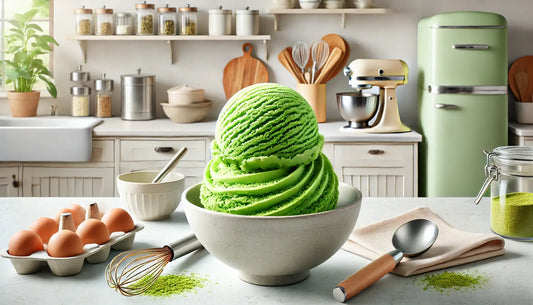Does green tea cause kidney stones? 🤕
This is a question we are often asked, and there are two main concerns ✌️
The first is caffeine and the second is oxalates.
In this article, we are going to talk about all things green tea and kidney stones.
We’ll discuss what causes kidney stones, and how green tea may have a role to play.
We’ll also show you why is green tea good for kidney stones and in the end we’ll recommend some great low caffeine, low oxalate green tea for kidney stones.
Let’s get started! 👇
Does green tea cause kidney stones?

So right off the bat, does green tea cause kidney stones? No.
Green tea is generally considered safe and is not commonly associated with an increased risk of kidney stones.
In fact, some studies suggest that certain components of green tea may have a protective effect against kidney stones, which we will discuss in a later section.
Is Green Tea Good for Kidneys? Yes! To learn more about it, read our article 👉 Is Green Tea Good for Kidneys? A Tea Expert Weighs in
Does green tea cause kidney stones more than black tea?
Green tea is actually lower in oxalates than black tea.
If you are trying to reduce your risk of kidney stones by avoiding high oxalate foods, you will want to switch from black tea to green tea.
If you want to see how green tea stacks up against black tea in terms of health benefits and production, you can read our article 👉 Black tea vs Green tea - A Battle is Brewing
What Causes Kidney Stones?
Now that we have answered does green tea cause kidney stones, let’s get to the bottom of this mystery and find out what really causes kidney stones. Kidney stones, also known as renal calculi, are solid crystalline structures that form in the kidneys.
They are typically caused Several factors contribute to the formation of kidney stones, and the specific cause can vary from person to person. Common factors include:
Dehydration
Insufficient fluid intake can lead to concentrated urine, which increases the risk of minerals and salts crystallizing and forming stones. Staying adequately hydrated is crucial for preventing kidney stones.
High Oxalate Intake
Even though green tea and kidney stones aren’t correlated, that doesn’t mean that certain foods can’t contribute to the formation of kidney stones. Foods high in oxalates, such as beets, chocolate, nuts, and certain leafy greens, can contribute to the formation of oxalate stones.
High Salt (Sodium) Intake
Excessive salt in the diet can lead to an increased excretion of calcium in the urine, contributing to the formation of calcium-based stones.
Certain Medical Conditions:
Hypercalciuria which is excessive calcium in the urine can lead to the formation of calcium-based stones. Similarly, Hyperoxaluria or high levels of oxalate in the urine can contribute to the formation of oxalate stones.
Can green tea cause kidney stones in excess?

Can green tea cause kidney stones if you drink a lot of it?
If you are not careful and you drink too much green tea, you may increase your risk of green tea kidney stones.
So what might make green tea cause kidney stones?
The answer is oxalates.
When people ask does green tea cause kidney stones, they are most likely concerned about the presence of oxalates in the tea.
It is important to remember that green tea is 99% water and only 1% leaf, so the amount of oxalates you get from drinking it are extremely low.
This makes it unlikely that you’ll form green tea kidney stones.
Is green tea bad for kidney stones?
While green tea and kidney stones are not really related, is there any reason why is green tea bad for kidney stones? As we mentioned before, there is a small amount of oxalates that can cause green tea kidney stones, but this is only a moderate risk.
Does the caffeine in green tea cause kidney stones?
Caffeine is another factor that makes people wonder does green tea cause kidney stones. The caffeine directly does not lead to green tea kidney stones, but in excess it can lead to dehydration, which can increase the risk of kidney stones.
One of the benefits of green tea for kidney stones is that unlike coffee it provides more hydration than it takes from the caffeine. Just make sure you are going for a low caffeine tea, which we will show you later. So is green tea good for kidney stones? It would appear so!
If you want to take a deep dive into the caffeine levels of green tea, we recommend you read this short article 👉 Which tea has the most caffeine
Why is green tea good for kidney stones?
Now that we’ve covered a few reasons why is green tea bad for kidney stones, let’s talk about is green tea good for kidney stones.
Hydration
Staying well-hydrated is crucial for preventing kidney stones. Green tea, like any fluid, contributes to overall hydration. Proper hydration helps dilute substances in the urine, reducing the concentration of minerals and preventing the formation of crystals that can lead to kidney stones.
Antioxidant Properties
Green tea is rich in antioxidants, particularly catechins such as epigallocatechin gallate (EGCG). Antioxidants can help combat oxidative stress and inflammation, which are factors that can contribute to kidney stone formation.
Green tea and kidney stones are just the tip of the iceberg when it comes to health benefits. If you want to learn more, check out our article 👉 Green Tea Benefits and Why You Should Drink it Everyday
Anti-Inflammatory Effects
Chronic inflammation and swelling in the body might be involved in the formation of kidney stones. Green tea has shown that it can reduce this kind of inflammation, which might help prevent kidney stones.
The best green tea for kidney stones
If you want to find the best green tea for kidney stones, you will want to go for teas that are low in caffeine and low in oxalates. Here are a few of our favorites:
Bancha
Bancha is a green tea made from the older leaves of the tea plant.
These older leaves are higher in minerals and lower in caffeine, making it a perfect green tea for kidney stones.
This tea is perfect to drink in the afternoon or evening and it can even help soothe the stomach after a meal.
Another benefit of bancha is that it is much more affordable compared to a normal leaf tea. You can get it for a small fraction of the price! If you want to learn more about bancha tea, you might like this article 👉 All you need to know About Bancha
Hojicha
Hojicha is a roasted Japanese green tea. Not only is the tea lower in caffeine, it is also lower in oxalates.
After the leaves are processed, they are roasted in a large pan.
This causes the color of the tea to change from green tea brown and the flavor begins to take on more of these roasted taste characteristics.
The roasting process reduces the oxalates in the tea leaves, which is why this is a good green tea for kidney stones.
If you're interested in hojicha tea benefits, we have the perfect article for you 👉 Tea Expert Reveals 9 Hojicha Benefits
Kukicha
Kukicha is a Japanese tea that is low in caffeine and low in oxalates. It’s made from a combination of stems and leaves.
The stems contribute a lower caffeine content, a higher mineral content and a pleasant straw flavor.
This tea began as a way to stretch the tea harvest and get more tea from the plants, but now it has become a respected tea in its own right.
Like bancha, this tea is much more affordable than a sencha or gyokuro and can be bought at a fraction of the price.
Want to learn more about Kukicha? This is the perfect article for you 👉 Everything You Need to Know About Kukicha
Does green tea cause kidney stones? The Final Verdict

So does green tea cause kidney stones?
It would appear that it is not much of a factor.
The oxalates in green tea are so low, you would really need to drink a lot in order for it to have much of an impact.
There are also a few reasons why is green tea good for kidney stones.
If you want to be extra careful, you can stick to the low caffeine, low oxalate green teas on our list.
You can still enjoy delicious green tea and not have to worry!







